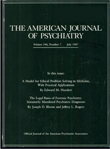Dynamics of ECT Normalization of Low G Protein Function and Immunoreactivity in Mononuclear Leukocytes of Patients With Major Depression
Abstract
OBJECTIVE: Heterotrimeric G proteins were previously implicated in the biochemical mechanisms underlying the pathophysiology and treatment of mood disorders. Low function and immunoreactivity of G proteins were observed in patients with major depression. In the present study the authors evaluated the effects of ECT on the low measures of G proteins in patients with major depression. METHOD: Repeated G protein measurements in mononuclear leukocytes of 10 patients with major depression were made. Each patient was examined while untreated and after successive sessions of ECT; 14 normal subjects were also studied. G protein function was evaluated through β-adrenergic- and muscarinic-agonist-enhanced guanine nucleotide binding capacity, substantiated by quantitative measures of G proteins through immunoblot analyses using polyclonal antibodies against Gsα, Giα, and Gβ proteins. RESULTS: Mononuclear leukocytes of patients with depression showed immunoreactive levels of Gsα and Giα that were significantly lower than those of normal subjects; the depressed patients also had markedly hypofunctional Gs and Gi. The low levels of G protein function and immunoreactivity were alleviated by ECT. Repeated measurements in the same patients after successive ECT sessions showed that the normalization of G protein measures preceded, and thus predicted, clinical improvement. The function and quantity of Gs and Gi proteins in patients given ECT were significantly correlated. CONCLUSIONS: These findings support the implication of G proteins in the pathophysiology and treatment of mood disorders. G protein measurements in patients with depression may potentially serve not only as a biochemical marker for affective state but also for biochemical prediction and evaluation of responses to ECT.



